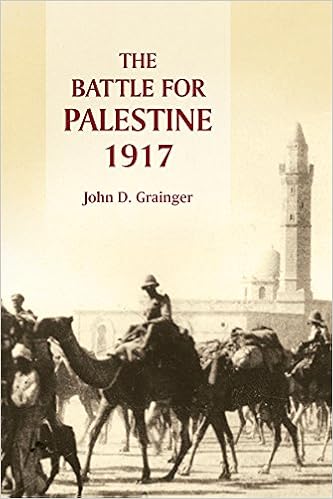
Grainger has written an excellent book about this campaign in Palestine during World War I, also know as the Third battle of Gaza. He takes the time to describe what happened during the first two battles, how Allenby turned things around, and then the battle itself, through to the capture of Jersualem. Grainger is an admirer of Allenby but that does not stop him from pointing out Allenby's mistakes and changes of plan during the battle. He spends a chapter at the end of the book summing up why the British won in 1917 and its affects on the theater and the war as a whole. Grainger's sources are mostly regimental and divisional histories of the British, Australian and New Zealand units involved in the campaign. Those histories include a good deal of primary source material. Grainger also researched primary sources at several British, Australian and New Zealand libraries and archives. He has also made use of a good deal of other secondary sources in English. Because the book is from the British point of view, there is not much from the Ottoman or German point of view. Overall this is an excellent book and is recommended for anyone interested in the military history of this campaign in World War I.
Three battles for the control of the key fortress-city of Gaza took place in 1917 between the British' force (with units from across the Empire, most notably the ANZACs) and the Turks. The Allies were repulsed twice but on their third attempt, under the newly appointed General Allenby, a veteran of the Western Front where he was a vocal critic of Haig's command, finally penetrated Turkish lines, captured southern Palestine and, as instructed by Lloyd George, took Jerusalem in time for Christmas, ending 400 years of Ottoman occupation. This third battle, similar in many ways to the contemporaneous fighting in France, is at the heart of this account, with consideration of intelligence, espionage, air-warfare, and diplomatic and political elements, not to mention the logistical and medical aspects of the campaign, particularly water. The generally overlooked Turkish defence, in the face of vastly superior numbers, is also assessed. Far from laying out and executing a pre-ordained plan, Allenby, who is probably still best remembered as T. E. Lawrence's commanding officer in Arabia, was flexible and adaptable, responding to developments as they occurred. JOHN D. GRAINGER is the author of numerous books on military history, ranging from the Roman period to the twentieth century.
No comments:
Post a Comment